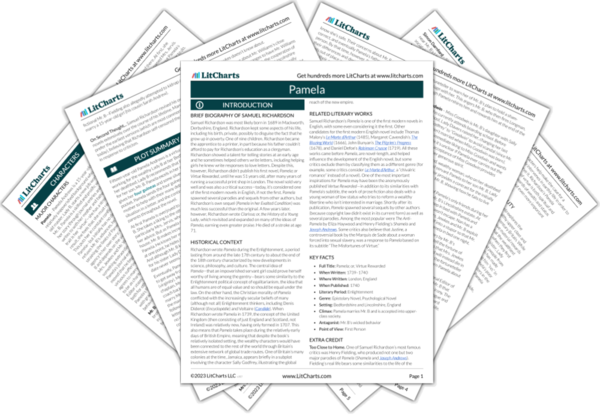The four guineas that Pamela receives from Mr. B after the death of Lady B symbolize the value of virtue and how no amount of material wealth is worth the spiritual price of virtue. Pamela sends the four guineas to her heavily indebted mother and father, establishing the generous nature of her personality early in the novel. But her parents refuse to use the money, suspecting (correctly) that Mr. B is attempting to buy Pamela off with the money so that he can freely have sex with her outside of marriage. Perhaps inspired by her parents’ principled refusal to spend the four guineas, Pamela herself resists all of Mr. B’s sexual advances, believing that her own chastity and spiritual condition are worth more than whatever material things Mr. B could provide for her. Although Pamela suffers greatly under Mr. B, eventually her patience is rewarded. While four guineas was quite a large sum of money for Pamela and her parents at the beginning of the novel, by the end, Mr. B marries Pamela, promising her an annual sum of 500 guineas and an additional annual income for her parents. By being patient, remaining faithful to God, and listening to her parents, Pamela received a much larger amount of money, and the material wealth that she achieves over the course of the book symbolizes the spiritual wealth that a person can attain by following Pamela’s virtuous example.
Four Guineas Quotes in Pamela
Dear Father and Mother,
I have great Trouble, and some Comfort, to acquaint you with. The Trouble is, that my good Lady died of the Illness I mention’d to you, and left us all much griev’d for the loss of her; for she was a dear good lady, and kind to all us her servants.
I hope the good ’Squire has no Design: but when he has given you so much Money, and speaks so kindly to you, and praises your coming on; and, Oh, that fatal word! that he would be kind to you, if you would do as you should do, almost kills us with fears.












